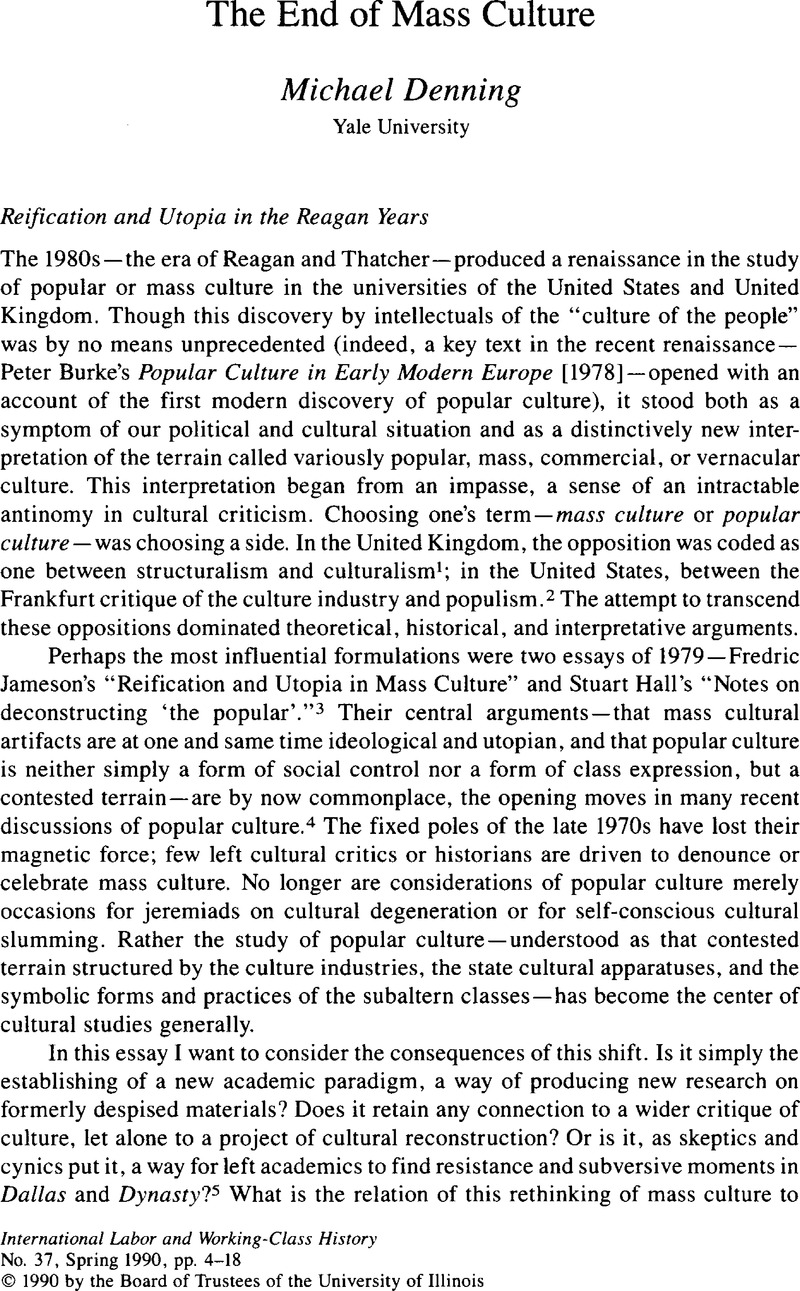Published online by Cambridge University Press: 16 December 2008

This essay was originally presented at the Colloquium on Mass Culture and the Working Class, Maison des Sciences de l'Homme, Paris, October 15, 1988.
1. See in particular Hall, Stuart, “Cultural Studies: Two Paradigms,” Media, Culture and Society 2 (1980):57–72Google Scholar; Johnson, Richard, “Three Problematics: Elements of a Theory of Working-Class Culture,” in Clarke, John et al. , Working Class Culture (London, 1979)Google Scholar; and Bennett, Tony, “The Politics of the ‘Popular’ and Popular Culture,” in Bennett, Tony et al. , Popular Culture and Social Relations (Milton Keynes, 1986).Google Scholar
2. SeeLazere, Donald, ed., American Media and Mass Culture (Berkeley, 1987).Google Scholar
3. I would also note the somewhat earlier essay by Jones, Gareth Stedman, “Class Expression versus Social Control?” History Workshop 4 (1977): 163–70.CrossRefGoogle Scholar
4. I will cite a version from my own study of U.S. dime novels as an example: “these popular stories … can be understood neither as forms of deception, manipulation, and social control nor as expressions of a genuine people's culture, opposing and resisting the dominant culture. Rather they are best seen as a contested terrain, a field of cultural conflict where signs with wide appeal and resonance take on contradictory disguises and are spoken with contrary accents.” Denning, Michael, Mechanic Accents: Dime Novels and Working-Class Culture in America (New York, 1987), 3.Google Scholar
5. For example, Jackson Lears noted that “left cultural historians have discovered traces of collective memory in Hollywood films, early network television programs, and other supposed citadels of social amnesia,” and went on to say that he thought “such arguments may exaggerate the significance of the dissent embodied in mass cultural forms. There is too strong a tendency to elevate what is often a univocal, closed system of imagery into an elegant Bakhtinian conversation, where every neofascist utterance by Clint Eastwood implies a counterfascist critique of ‘late capitalism’.” (“Power, Culture, and Memory” Journal of American History 75 [1988]:139)Google Scholar Similarly, Judith Williamson (like Lears an analyst of advertising) has recently complained of “left-wing academics … picking out strands of ‘subversion’ in every piece of pop culture from Street Style to Soap Opera.” (Quoted in Morris, Meaghan, “Banality in Cultural Studies,” Discourse 10 [1988]:3.)Google Scholar
6. Jameson, Fredric, “Reification and Utopia in Mass Culture,” Social Text 1 (1979): 139.Google Scholar
7. Hall, Stuart, “Notes on Deconstructing ‘the Popular’,” in People's History and Socialist Theory, ed. Samuel, Raphael (London, 1981), 234, 239 (originally delivered in 1979).Google Scholar
8. Hall, “Deconstructing ‘the Popular’,” 233.
9. Jameson, “Reification and Utopia,” 144.
10. Hall, “Deconstructing ‘the Popular’,” 229.
11. Jameson, “Reification and Utopia,” 134, 139–40.
12. Hall, “Deconstructing ‘the Popular’,” 233.
13. On the romance, see Radway, Janice, Reading the Romance (Chapel Hill, 1984)Google Scholar and Modleski, Tania, Loving with a Vengeance (Hamden, 1982).Google Scholar On Hollywood melodrama, see Gledhill, Christine, ed., Home Is Where the Heart Is (Urbana, 1987).Google Scholar Indeed, one of the first appropriations of Jameson's “reification and Utopia” framework came in one of Radway's early essays on romance fiction.
14. A number of treatments of post-modernism make this argument; see in particular Huyssen, Andreas, After the Great Divide (Bloomington, 1986)CrossRefGoogle Scholar and Collins, Jim, Uncommon Cultures (New York, 1989).Google Scholar
15. Jameson, “Reification and Utopia,” 133.
16. Buhle, Paul, ed., Popular Culture in America (Minneapolis, 1987), x.Google Scholar
17. Buhle, ed., Popular Culture, xxiv.
18. Sartre, Jean-Paul, Search for a Method (New York, 1968), 56.Google Scholar
19. Jameson, “Reification and Utopia,” 140.
20. Ohmann, Richard, Politics of Letters (Middletown, 1987)Google Scholar; Tompkins, Jane, Sensational Designs (New York, 1986)Google Scholar; Schwartz, Lawrence, Creating Faulkner's Reputation (Knoxville, 1988)Google Scholar; Pfeil, Fred, “Montage Dynasty: On the Packaging of Pleasure in American Fiction,” unpublished essay; Levine, Lawrence, Highbrow Lowbrow (Cambridge, 1988).Google Scholar
21. Bourdieu, Pierre, Distinction (Cambridge, 1984), 569 n.81, 87.Google Scholar
22. The key intervention was Lears, Jackson, “The Concept of Cultural Hegemony,” American Historical Review 90 (1985):567–93.CrossRefGoogle Scholar The term also emerged in the controversy between Thomas Haskell and David Brion Davis over the relation between capitalism and abolitionism (Haskell, , “Convention and Hegemonic Interest in the Debate over Antislavery,” American Historical Review 92 [1987]:829–78)CrossRefGoogle Scholar and has been the subject of an illuminating symposium on labor history and the concept of hegemony in the Journal of American History 75 (06 1988):115–61.Google Scholar
23. Foner, Eric, “Why Is There no Socialism in the United States?” History Workshop 17 (1984):64.CrossRefGoogle Scholar
24. Haskell, “Convention and Hegemonic Interest,” 834.
25. Lears, “Concept of Cultural Hegemony,” 568.
26. Lipsitz, George, “The Struggle for Hegemony,” Journal of American History 75 (1988):146.CrossRefGoogle Scholar
27. Bourdieu, Distinction, 88.
28. Williams, Raymond, Culture (London, 1981), 93.Google ScholarPubMed
29. Bourdieu, Distinction, 32.